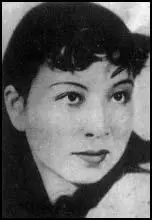Jiang Qing

Jiang Qing, the daughter of a carpenter, was born in Zhucheng, China, in 1914. After being educated at Qingdao University she worked as a stage and film actress in Shanghai.
In 1936 Jiang Qing joined the Chinese Communist Party. Soon afterwards she met Mao Zedong and she became his third wife in 1939. After the establishment of the People's Republic of China in 1949, Jiang Qing worked in the Ministry of Culture.
Jiang Qing emerged as a serious political figure in China during the Cultural Revolution when she criticizedparty leaders such as Liu Shaoqi, who favoured the introduction of piecework, greater wage differentials and measures that sought to undermine collective farms and factories.
During this period Mao Zedong galvanized students and young workers as his Red Guards to attack revisionists in the party. Mao told them the revolution was in danger and that they must do all they could to stop the emergence of a privileged class in China. He argued this is what had happened in the Soviet Union under Joseph Stalin and Nikita Khrushchev.
The Cultural Revolution came to an end when Liu Shaoqi resigned from all his posts on 13th October 1968. Lin Biao now became Mao's designated successor. Mao now gave his support to the Gang of Four: Jiang Qing, Wang Hongwen, Yao Wenyuan and Zhange Chungqiao. These four radicals occupied powerful positions in the Politburo after the Tenth Party Congress of 1973.
After the death of Mao in 1976 the power of the Gang of Four declined dramatically. In 1980 they were found guilty of plotting against the state. Jiang Qing and Zhange Chungqiao, who were considered to be the leaders, were sentenced to death (later commuted to life imprisonment).
Jiang Qing died in 1991. Later the government claimed that she had committed suicide.
